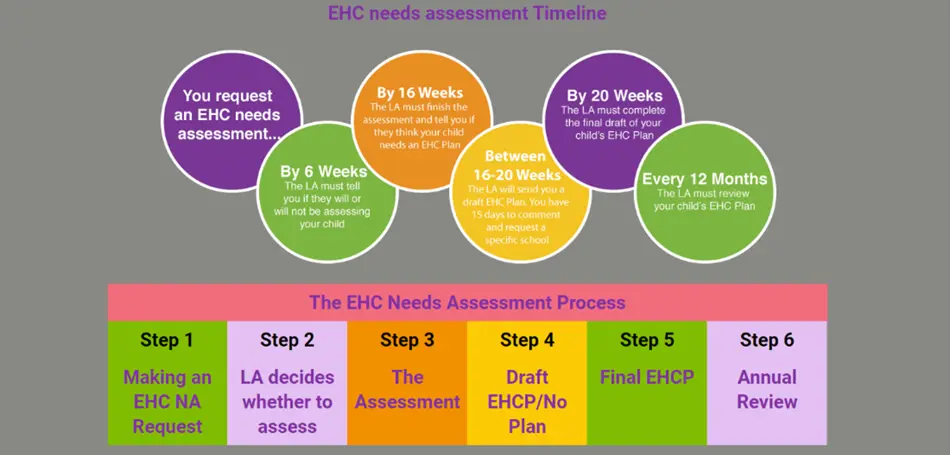
Read on to find out more details about what should happen during the 6 key stages of the EHC Needs Assessment process, and how you can be involved with these.
Week 0
Request for assessment is made to the local authority by a school, setting, individual with parental responsibility or other professional e.g. Health and Social Care.
Week 0-6
The LA has 6 weeks to decide whether an assessment should commence. If the LA decides not to proceed with an assessment, settings and parents/carers will be notified in writing with information about the LA decision and parents/carers right to appeal. A follow-up meeting to support settings and parents/carers with next steps following a 'no to assess' decision is available upon request.
Week 6
If yes to assess the EHC assessment starts. The LA must gather advice and information as to:
- the child's needs;
- the provision needed to support those needs;
- the outcomes that would be expected to result from the provision being put in place.
The LA must seek:
- advice and information from the child’s parents/carers or the young person;
- educational advice and information from the head teacher or principal of the early years setting, school, post-16 or other institution that the child or young person is attending (or another appropriate person where this is not available);
- medical advice and information from a health care professional identified by the responsible commissioning body;
- psychological advice and information – from an Educational Psychologist;
- advice and information in relation to social care;
- advice and information from any other person the local authority thinks is appropriate;
- advice and information from any person the child’s parents/carers and/or young person reasonably requests that the LA seek advice from.
The SEND Code of Practice states that the advice should be clear, accessible and specific (pg. 157, 9.51). There is only one exception to seeking new advice which is where it is agreed, in relation to a particular advice, that existing information and advice is “sufficient” for the purposes of the assessment. The judgement that an individual report is sufficient must be made by all of the following:
- the LA;
- the original author of that report, and;
- the parents/carers or young person.
If any one of the above disagrees or is no longer available, then the LA must seek new advice. A LA must not make a “blanket” decision that all existing information and advice is sufficient for a child but must look at each piece of advice and request consent from the author and the parents/carers or young person. The SEND Code of Practice (pg. 155, 9.47) advises that parents/carers and young people should be supported to make an informed decision.
Week 14
A draft EHC Plan needs to have been produced and sent to the parents/carers or young person by this time. At the same time, the LA must advise the parents/carers or children/young person where they can find information about the settings that are available for the child to attend. The parents/carers or child then has at least 15 calendar days after receipt of the draft plan in which to:
- make representations to the LA about the contents of the draft EHC plan;
- ask for a meeting with an LA officer to discuss the draft EHC plan;
- tell the LA the setting they would like named in the final EHC plan.
Week 16
If the LA decides not to issue an EHC plan, having carried out the EHC needs assessment they must so notify the parent/young person by this date. The parent/young person will have a right of appeal to the Special Educational Needs and Disability Tribunal against the decision to refuse to issue a plan.
Where an LA has issued an EHC Plan, the LA must consult with the early years setting, school/college, the parents/carers or child has requested. The setting should respond to the LA within 15 days (SEND Code paragraph pg. 173, 9.83).
Week 20
Final EHC plan issued by the LA.
This must be sent to the parent/carer or the child/young person; the manager of the setting, other institution or provider named in the EHC Plan and the responsible commissioning body.